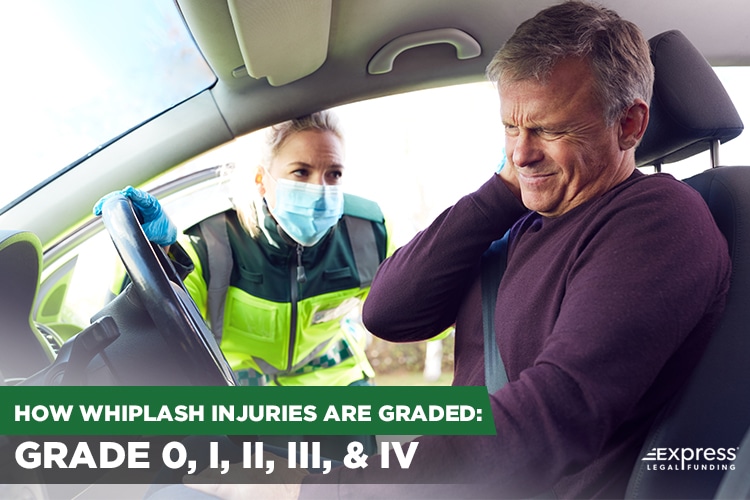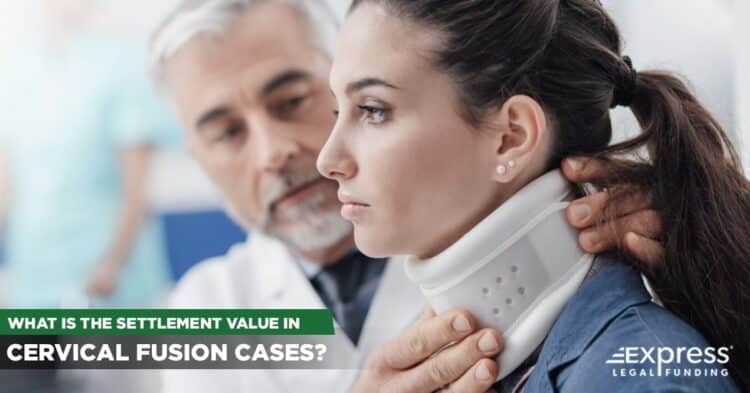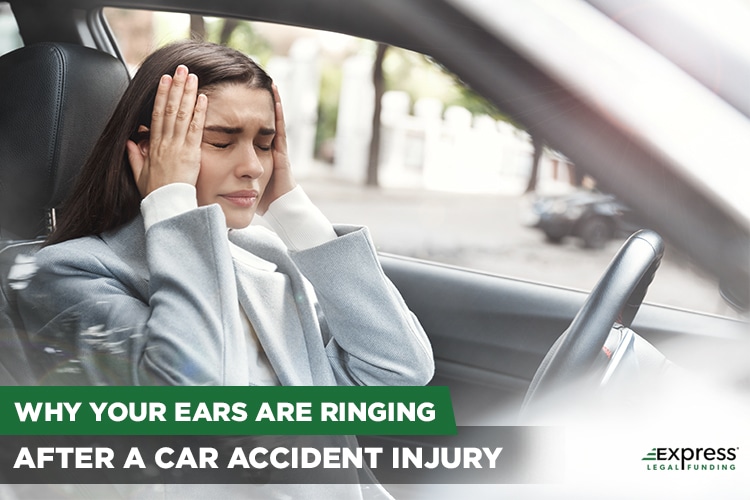
Experiencing ringing in your ears, known as tinnitus, after a car accident can be unsettling and may signal underlying injuries that require attention.
Whether it’s caused by head trauma, whiplash, or the sheer impact of the collision, tinnitus can disrupt your daily life and indicate more serious conditions.
In this article, we’ll explore the common causes of ear ringing after a car accident, its potential connection to other injuries, and why seeking prompt medical attention is crucial for your recovery.

Understanding these factors can help you address symptoms effectively and navigate your next steps with confidence.
Ears Ringing After a Car Accident?
Interestingly, unlike neck pain symptoms from whiplash, there is another side effect of car crashes that is not commonly discussed but is common in several types of brain and whiplash injuries.
Many people have a ringing sound in their inner or middle ears after a car accident, which makes hearing uncomfortable and difficult.
The questions and focus of this article are: Why can you have ringing in your ears after a car accident, and if so, how long does it last?
What is Tinnitus?
Hearing ringing in your ears could happen to anyone and is identifiable by medical standards. This sensation is medically identified as tinnitus, a medical condition affecting between 15% to 20% of the human population.
The condition is most prevalent in older adults, but no specific age range is immune to developing it. It is so common and transcends physical traits because tinnitus is traditionally a symptom of an underlying condition.

As a result, a completely unrelated illness or injury can induce tinnitus in a patient.
Determining whether you have tinnitus is usually easy since there are specific symptoms that are hard to miss and are easy to describe.
The most common symptom of tinnitus is a ringing sensation in the ear, but the symptoms can manifest as other sounds like buzzing, clicking, or humming.
Most of the time, tinnitus is temporary, as ear ringing can be caused by an acute sinus infection or ear infection, which typically cures itself without antibiotics.
When someone does have permanent tinnitus, the severity can come and go and is not constant, as those who suffer from it may experience mild nuisances that do not inhibit or interfere with their quality of life.
While the name itself suggests that permanent tinnitus lasts for life, the symptoms usually come in small waves that cease after a few seconds.
Still, there are cases where the symptoms can be overwhelming and drastically affect your ability to focus on or hear anything else. Before we go on to discuss the potential permanency of tinnitus, let’s list the three main types of tinnitus:
What are the Different Types of Tinnitus?
There are three main types of tinnitus that are differentiated by their causes and include: Subjective, Objective, and Pulsatile tinnitus.
Types of Tinnitus:
- Subjective tinnitus: The most common type of tinnitus means the person who has it is the only one who can hear the ringing in their ears. It is subjective to the sufferer, as others cannot detect it.
- Objective tinnitus: This is a less common type of tinnitus, characterized by an audible sound that other people can hear and not solely the person suffering from their ears ringing.
Most often, it can be a side effect of high blood pressure. Other people can detect objective tinnitus, albeit not with the naked ear, using a stethoscope device. - Pulsatile tinnitus: Like objective tinnitus, there is a physical cause to this type that others can detect. However, what makes pulsatile tinnitus unique is that, instead of traditional ear ringing, it is characterized by hearing a rhythmic pulsing, which matches the heart rate of the person suffering from the symptom.
So, an increase in beats per minute will increase the frequency of the pulsation being heard. Blood vessel disorders and hypertension can cause pulsatile tinnitus.
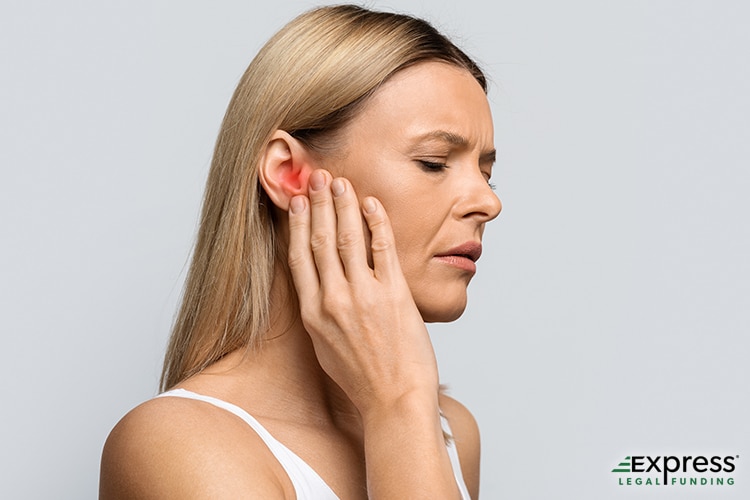
Can Tinnitus Be Temporary?
Yes, tinnitus is usually temporary, and most temporary cases can be expected to go away within a couple of weeks of the onset of ear-ringing symptoms.
Although loud noise exposure is the most common cause of permanent and temporary tinnitus, other factors can cause the condition.
This typically means you can expect the ear ringing to be temporary and not take long to resolve.
What Causes Temporary Tinnitus?
In addition to loud noise, some of the most common causes of temporary tinnitus include the following:
- Ear infection
- Excessive buildup of earwax
- Perforated eardrum
- Certain medications
Can Earwax Cause Tinnitus?
Yes, cerumen, commonly known as “earwax,” can cause tinnitus when the body overproduces cerumen and causes a blockage in the ear canal. Too much earwax can change the pressure in your ears, which can increase pressure, resulting in tinnitus.
However, as mentioned earlier, there are multiple possible causes of tinnitus, many of which do not relate to the amount of earwax our bodies produce.
A research study performed by Dr. Robert Ferrari indicates that in people reporting tinnitus, overproducing ear wax is less common than cases than those of people after a whiplash accident.
Thus, some severe medical conditions and injuries can cause tinnitus, which does not include loud noises.
Other causes of tinnitus are more serious health conditions and ear injuries, including chronic illnesses that cause tinnitus as a byproduct of their more serious symptoms, which include the following:
Common Conditions Associated With Tinnitus:
- Migraines
- Diabetes
- Blood vessel disorders, such as high blood pressure
- Thyroid conditions
- Lupus
- Rheumatoid arthritis
- Temporomandibular joint (TMJ) – Jaw muscle and joint disorder
- Brain, head, and neck tumors
- Eustachian tube dysfunction
Risk Factors For Hearing Loss and Tinnitus
What risk factors are there for hearing loss and tinnitus? Certain demographics are at a higher risk for hearing loss and tinnitus due to physical, lifestyle, or biological factors. These factors include:
- Loud Sounds: People who work in environments with consistent loud noises from heavy machinery, firearms, and power tools subject their ears to acoustic trauma (injury to hearing mechanisms).
The same principle applies to individuals who listen to music while wearing headphones on their phones and MP3 players at too high volumes for too long (frequent and extended exposure to unsafe decibel levels can lead to permanent hearing loss).
People have a higher risk of developing chronic tinnitus and ear pain due to their ears’ consistently being exposed to loud sounds.
Doctor Gayla L. Poling, Ph.D., at the Mayo Clinic reports, “Ninety percent of people with tinnitus have hearing loss.” The concept is that you likely have hearing loss if you have tinnitus. - Age: As we age, our bodies lose functionality in certain areas, including the tiny hair cells in our inner ears that are critical to our auditory system, gradually leading to permanent hearing loss.
Tinnitus can be the first sign of hearing loss in older people and significantly increase the risk of dementia. Unfortunately, age-related hearing loss cannot be reversed. - Sex Assigned at Birth (male/female): Biological men are at a higher risk of tinnitus. The exact reason biological men are more susceptible is not fully understood, but they appear predisposed to the condition. However, audiologists report that the disparity is caused by men generally being exposed to louder noise than women. For instance, compared to women, a larger percentage of men have historically worked jobs under loud conditions, such as factories and construction sites, where loud machinery (metal stamping, jackhammers, and drills) is used, as well as having hobbies that involve loud noises (Hunting with guns, riding motorcycles, and mowing the lawn).
- Various Health Factors. Those who struggle with high blood pressure, have arthritis, have hypertension, or are overweight or obese are also more likely to have tinnitus.

- Smokers: Studies have linked cigarette smoke as a cause of hearing loss, which includes secondhand smoke. Smokers and their loved ones are at a significantly higher risk of suffering auditory loss when compared to non-smokers.
- Certain Medications: Certain medications are commonly associated with having a toxic and damaging effect on the ear nerves and can cause temporary and permanent hearing loss.
What medications cause tinnitus? Medications known as ototoxic drugs (toxic to ears) can cause tinnitus, which includes Aspirin, Benzodiazepines (Xanax, Valium, Ativan), certain antibiotics, Beta-blockers, certain cancer drugs, and anti-inflammatories, among others.
Tinnitus Affects About 10% of Adults in the U.S.
How many people have tinnitus? Tinnitus is a common problem worldwide, and according to the American Tinnitus Association (ACA), it affects more than 25 million American adults.
Tinnitus is Not Medically Dangerous
Is tinnitus dangerous? The condition itself is not dangerous. It is more likely that tinnitus is a byproduct of another condition or serious injury that can threaten your health.
While most of these conditions are illnesses or biological factors, there is the question of how physical injury plays a role in tinnitus.
Can a Car Accident Cause Tinnitus?
Yes, car accidents can cause tinnitus, which is an ear-ringing symptom. You are more likely to have ear ringing after a car accident resulting in head trauma, such as a concussion or a traumatic brain injury (TBI).
When your body gets jostled around in a car crash, it is easy to hit your head on the car’s interior, which can lead to head trauma since the jolt to your car can cause you to hit your head on the steering wheel, headrest, dashboard, or window.
With enough force, you could experience a traumatic head injury that causes your brain to collide with your skull.
This can result in a concussion or a more severe TBI (traumatic brain injury ). This damage to your brain can impact your body’s ability to regulate its senses, which is why it can result in ear-ringing symptoms.
Your brain is linked to and controls your critical sensory nerves and receptors to sense and interact with stimuli (eyesight, smell, taste, etc.), which include the following:
Types of Sensory Nerves:
- Mechanoreceptors – Respond to touch and sound
- Thermoreceptors – Respond to a change in temperature: hot and cold
- Nociceptors – Respond to painful stimuli
- Photoreceptors – Respond to being exposed to light
- Chemoreceptors – Respond to changes in the chemical composition of blood
Your senses of hearing and sight can be affected whenever your brain is injured, which combined can make your symptoms worse.
One of the main auditory symptoms of a concussion is acute tinnitus, which is why many car crash accident victims experience a ringing in their ears.
Tinnitus can also result from other types of injuries and head traumas than those incurred in car accidents, such as injuries caused by playing collision sports.
A car accident can have fatal results depending on what vehicles were involved and how fast they were going.
The most severe collisions usually involve motorcycles or semi-trucks, but standard cars and pickup trucks can have devastating collisions with each other.
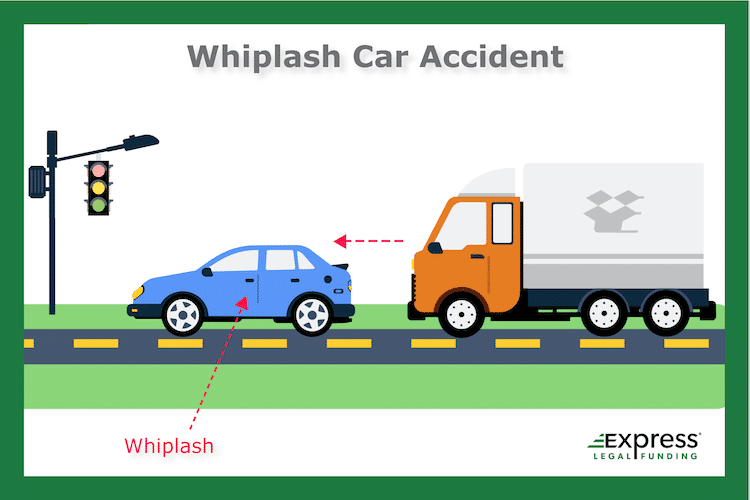
Regardless, motor vehicle collisions are an accepted reality that usually affects everyone at some point. If you have been in a car accident, you may have suffered injuries that require you to go to the hospital to ensure there is no severe damage to your body.
You might not have felt the head trauma initially due to the body’s adrenaline response, but you might have noticed a ringing in your ears after the accident.
Believe it or not, this is a common side effect of a car crash since the force of the collision can impact the nerves connected to your ears.
More specifically: Can Whiplash Cause Tinnitus?
Yes, whiplash injuries from car accidents can cause damage to your central nervous system since whiplash affects the cervical vertebrae in the neck, which contain the spinal cord that connects the brain to the rest of the body.
In fact, a study performed by ENT Doctor Jim Graham shows that about 10% of people who suffer a whiplash injury will also have otological symptoms, which can include tinnitus as well as hearing loss and vertigo.
Whiplash occurs when the momentum of the crash causes your body to shake and shift with enough force that it can cause soft tissue damage and even broken bones in your neck, causing swelling.
The inflammation of the tissues in this type of cervical neck injury can cause damage to the nerves in your brain stem, which can cause tinnitus symptoms to manifest.
One reality and concern is that tinnitus caused by a whiplash injury is not always reversible, and nearly 20% of all cases of whiplash-induced tinnitus are permanent.
That means a whiplash injury from a car crash can permanently damage your hearing and prevent you from properly registering sounds under specific decibel ranges.
Tinnitus After Airbag Deployment
Finally, another common cause of tinnitus in car crashes is the result of a safety feature that most vehicles possess. All cars have lifesaving airbags that deploy when the car is subjected to a major collision.
The bags cushion the driver’s head from an impact to reduce the risk of traumatic injury or death. Unfortunately, airbags have a significant flaw in their design that can damage your hearing, which modern engineers and mechanics have yet to resolve due to technical limitations.
Can an Airbag Cause Tinnitus?
Yes, airbag deployment can cause tinnitus, as it explodes from the dashboard, generating a significant force that can hit your face, damaging your ears while saving your life during a car accident.
The downside of airbag explosions causing minor injuries is the price we must pay, as airbags help prevent more severe and fatal injuries during motor vehicle collisions.
Nevertheless, when it comes to our auditory system, an airbag’s deployment generates significant levels of acoustic pressure, equating to being exposed to noise louder than a jet engine.

This sudden blast of acoustic pressure (also called sound power) can cause the fragile bones in our ears to break. This includes breaking the stapes bone in our middle ear, which we require to properly register sound vibrations.
The stapes is the smallest bone (“stirrup bone”) in our bodies and is located in the middle ear.
Stapes and middle ear bone fractures can result in permanent hearing loss and tinnitus, which may require a stapedectomy, a replacement surgery where a surgeon removes the broken stapes bone and replaces it with a prosthetic implant device to fix the hearing loss issues.
Ringing in our eardrums after a car accident is common. It almost always means the car accident victim suffered a more serious condition, of which tinnitus is a symptom and not the diagnosis.
Therefore, you should immediately seek medical attention if you experience ear-ringing symptoms after a car crash. Otherwise, you might allow a severe injury to go unaddressed and suffer exacerbated symptoms.
While seeking medical attention is essential, dealing with the financial stress of a hospital visit due to someone else’s reckless driving is infuriating.
Fortunately, the American legal system has empowered people, citizens and noncitizens alike, to take legal action and sue negligent drivers who injured them in car accidents.
What to Do Next: After a Car Accident
Being involved in a motor vehicle accident and dealing with the associated injuries can be overwhelming and costly. The biggest concern car crash victims have immediately following a wreck is to seek medical treatment.
However, once those injured in the accident get seen in the emergency room, the concern can quickly shift to worrying about how they will pay for the health care treatment they just received and the follow-up appointments they are being ordered to get.
Even when you have health insurance, you can expect deductibles and hospital copays to cost you thousands of dollars, all of which are unexpected when you have been in a car accident.
You can go from being on top of your bills and daily expenses to owing thousands of dollars within just a few hours after getting in a car wreck, which is all the more challenging when the other car’s driver is at fault.
Thankfully, the American civil justice system has legal measures in place that allow us to pursue the maximum compensation we deserve from the person or entity responsible for causing the accident, enabling us to recover financially from our losses via filing a personal injury lawsuit, which is one of the most common civil proceedings today.
Hire a Personal Injury Attorney
The most effective way to accomplish this is by hiring a personal injury lawyer to represent and guide you through the car accident claim process.
That way, you get compensated for your losses either through a car accident settlement or jury award (if your accident attorney litigates the case in court).
Financial compensation is crucial when you suffer from tinnitus symptoms resulting from a car accident collision involving the other driver’s negligence.
Countless “no win, no fee” car accident lawyer commercials and billboards make it seem like you can expect a settlement worth millions of dollars, and all you have to do is call their law firm after a free consultation, and the next thing you know, you are “rich” overnight.
However, that is never the case. Unfortunately, it’s a challenging process that can take several months or even a few years to settle a personal injury claim in your favor.

Attorney-Client Relationship in Car Accident Cases
In addition to their expert legal advice, the most critical thing car accident attorneys must do is prove the other driver was at fault, which is always hard to do, even when the facts are clear.
Insurance company adjusters and their defense attorneys will try to disprove their client’s culpability in an effort to absolve themselves of any liability.
Insurance adjusters will review the police report and go through your medical records with a fine-tooth comb. It’s their job not to give you a settlement payout if they can get away with it.
Fortunately, proving fault in a motor vehicle collision is usually simple since there are witnesses, traffic footage, and corroborating evidence from the damage your vehicle sustained.
Tinnitus Lawsuit Settlement Amounts
The other major component to getting a fair car accident and tinnitus settlement is proving that your injuries resulted from the accident and that the medical treatment you received was necessary.
Typically, the higher your medical bills, the larger the settlement you can get.
This principle includes the average settlement amounts for tinnitus auto accident cases, as the victim will likely require more treatments than a less severe rear-end collision lawsuit, with the personal injury victim suffering a lower grade of whiplash.
What is the Average Tinnitus Settlement Amount?
Legal professionals estimate the average settlement payout to be around $100,000 USD. That estimate is considerably higher than the average car accident settlement.
However, it is essential to note that factors like insurance policy limits can lower the maximum amount you can receive.
Some people try to take advantage of the system to get a larger settlement amount by claiming pre-existing injuries were caused by a recent accident.
The reason car accident victims fall into the trap of doing so is that most personal injury settlements are determined by the overall expense incurred from treatment and other medical costs to heal from the car accident.
So people think that if they increase the total amount of the medical expenses owed for the accident by having unrelated treatments (or exaggerating their pain and suffering), they will net a larger settlement.
Not only is doing this unethical, it is risky and can sabotage your case and deprive you of the fair settlement you deserve. Car accident lawyers advise their clients how honesty is the key to any lawsuit.
When it comes to your tinnitus symptoms and other conditions like vertigo, you are experiencing after a car crash, it could indicate a more significant injury issue.
For example, whiplash, concussions, or temporal fractures, among other injuries, can affect your nervous system. So if you have ringing in your ears after a car accident, you should go immediately to see a doctor.
While a personal injury lawsuit can help you recover from the financial strain of a motor vehicle collision, there is another concern you may have in the meantime.
That worry is: How will I pay for my personal expenses during a lawsuit if I am hurt and out of work?
Fortunately, there is a solution for that particular issue, so you can focus on recovering physically from the car accident.
Closing Statements on Ear Ringing After a Car Accident
We at Express Legal Funding understand the very nature and reason you need to sue for your losses after a car accident means you can be placed in a financially tenuous situation while your attorney is still building, negotiating, or litigating your case.
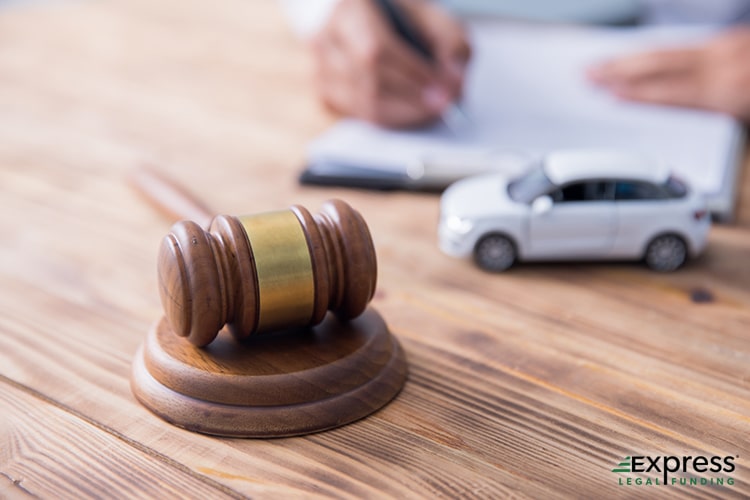
Extra expenses combined with less income make it easy to get behind on your bills and become strapped for cash during a car accident injury lawsuit, and this is where we can step in to help you.
Legal Funding for Car Accident Injury Cases
Our company, Express Legal Funding is a pre-settlement funding company based in Plano, Texas, with clients across the United States. That means we are in the business of advancing pre-settlement funds to clients who are waiting for their claims to be settled or won.
From a contract perspective, how the legal funding transaction works is that we, as the pre-settlement funding company, buy a stake in your claim’s potential proceeds, which means you are a part of what we all hope to be your future settlement or trial award money.
It’s a purchase agreement between a buyer (the lawsuit funding company) and a seller (you, the claimant), which means it’s not a loan.
Instead, it is a non-recourse advance, with whether we are able to be paid for the funds advanced to you contingent upon there actually being money recovered from your claim.
So if you choose to court in an effort to secure the financial compensation you deserve but outright lose, the legal funding you can get from us is yours to keep.
Meaning you don’t have to pay us anything back. Plus, since we do not charge any upfront fees, the money will cost you nothing.
So by obtaining pre-settlement funding, you secure the ability to ensure you will get money for having a claim even when you lose. So, not only does lawsuit funding allow you to get pre-settlement money now when you need it.
At the end of the day, pre-settlement funding for your claim can be an excellent financial resource option to use if you are strapped for cash and have no other places to access money from.
We hope you found this a valuable resource about how car accidents can cause your ears to ring (tinnitus) and encourage you to read more of our leading company blog.
In the meantime, you can give us a call anytime, 24/7, to apply and learn more about the legal funding options we can provide.
(Missouri consumers: Please be aware that the type of pre-settlement financing we can provide to injured and damaged workers in Missouri is recourse loans.
Therefore, they are not risk-free advances contingent upon a potential settlement or jury-awarded proceeds.
Lawsuit loans and post-settlement loans for Workers’ Compensation in states like Missouri are recourse loans and must, technically, by law, be repaid. Express Legal Funding-Missouri, LLC is a loan company licensed to give these loans in MO.)


